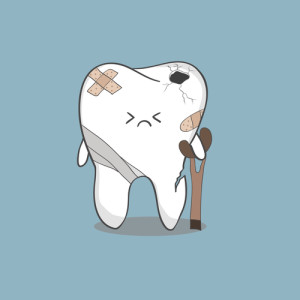 Tooth pain is never a good thing – but when does it merit immediate attention? Taking a closer look at your teeth will help you figure out how to move forward. Some issues will fade with time and healing, while others will require professional intervention to improve. Which category does your discomfort fall under?
Tooth pain is never a good thing – but when does it merit immediate attention? Taking a closer look at your teeth will help you figure out how to move forward. Some issues will fade with time and healing, while others will require professional intervention to improve. Which category does your discomfort fall under?
Ultimately, if your oral pain is interfering with your daily life, then it qualifies as a dental emergency. Receiving care will help you find pain relief and get your smile working again. Don’t hold back from finding treatment because you’re anxious that the issue isn’t an emergency – the sooner you take action, the simpler treatment is likely to be. Read on for a guide to common causes of tooth pain, and get in touch if you’re ever feeling uncomfortable.
Understanding Your Tooth Pain
Fact of the matter is, it’s hard to know what’s causing your discomfort without professional tools. Tooth pain can mean many different things, and be a symptom of a variety of dental problems. Some are minor, and some are serious. This is why it’s a wise plan to schedule an appointment once the pain arises – sure, it could go away on its own, but it could also just be the first symptom of a larger problem.
If you’re experiencing oral discomfort, it could stem from any of the following:
- Grinding – So many adults hold their stress in their jaws; it has to find an outlet somehow. This often emerges in the form of chronic clenching and grinding. If you wake up with sore teeth and headaches, grinding is the likely culprit. This type of pain is typically dull, aching, and worse in the morning.
- Worn enamel – If you experience tooth sensitivity when eating certain foods, or sipping on hot or cold drinks, your enamel may not be doing its job. Problems like grinding or the regular consumption of highly acidic drinks (like cola) will gradually erode your enamel, and heighten sensitivity.
- Cavity – Tooth decay causes twinges, and that pain can alert you to the presence of a cavity. If you see discoloration on the tooth, that’s another clue.
- Abscess – If a cavity progresses and reaches the inner area of a tooth, it can cause pulp damage. An abscessed tooth can be incredibly painful, as the inner nerves are activated by the infection. You may have an abscess if you experience sharp, deep pain within a tooth, especially after biting. You may also notice swelling on the gums. A root canal should be scheduled as soon as possible, or you may lose your tooth entirely.
- Injury – If you have suffered a blow to the mouth or jaw, you should seek emergency medical care right away. Only a professional can ensure that everything’s in the right place after physical trauma.
- Broken dental work – Fillings, veneers, and crowns don’t last forever, unfortunately. If you’re feeling sharp pain and notice a jagged edge on a tooth with dental work, it’s likely that you need to have that restoration replaced.
- Cold or sinus infection – If your sinuses are full or you’re congested, you may experience pressure on your upper teeth. When tooth pain accompanies a cold, this is usually related to the illness and not to a dental problem.
Marrero Emergency Dentist | Dental Emergency Marrero | Marrero Dental Emergency
Related Articles
Have you noticed blood when you brush your teeth or floss? Seeing your gums bleed can be scary. While it's not always a sign of something serious, bleeding gums should...
Missing a tooth can really seem like a big deal. Whether it's affecting the way you chew, your speech, or you simply don't like how you look, it's something you...
Many people avoid visiting the dentist because they worry about the cost. But investing in your dental health doesn’t have to break the bank. From routine checkups to more involved...
 Tooth pain is never a good thing – but when does it merit immediate attention? Taking a closer look at your teeth will help you figure out how to move forward. Some issues will fade with time and healing, while others will require professional intervention to improve. Which category does your discomfort fall under?
Tooth pain is never a good thing – but when does it merit immediate attention? Taking a closer look at your teeth will help you figure out how to move forward. Some issues will fade with time and healing, while others will require professional intervention to improve. Which category does your discomfort fall under?